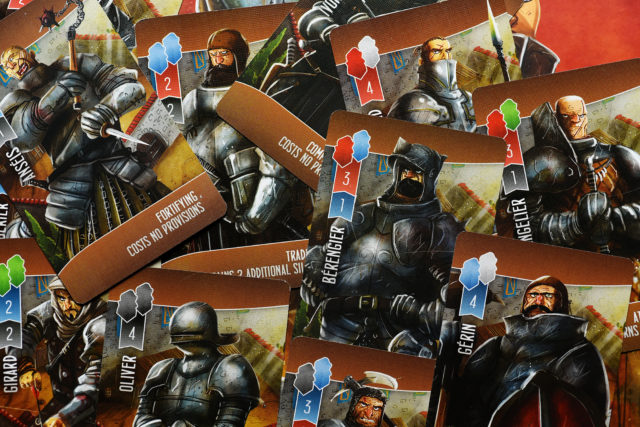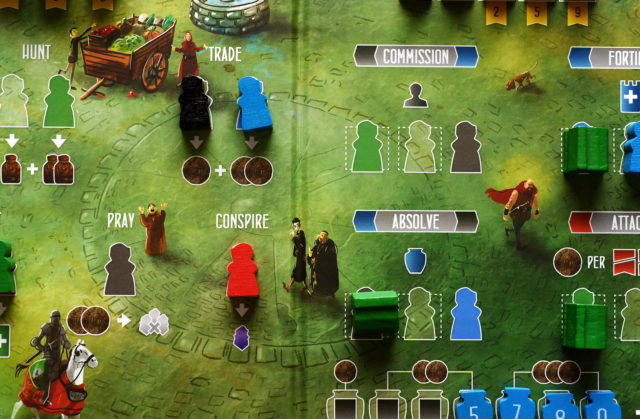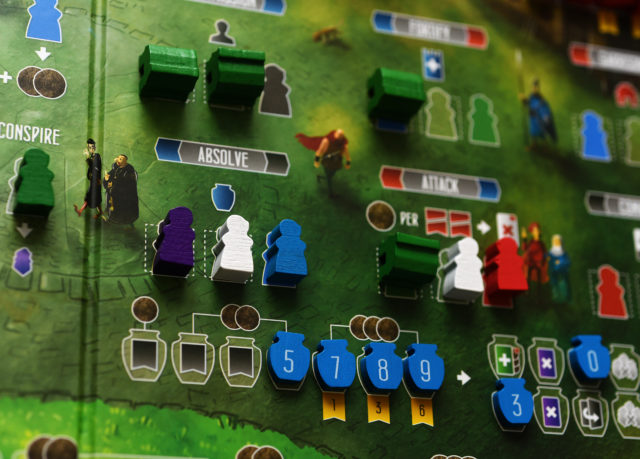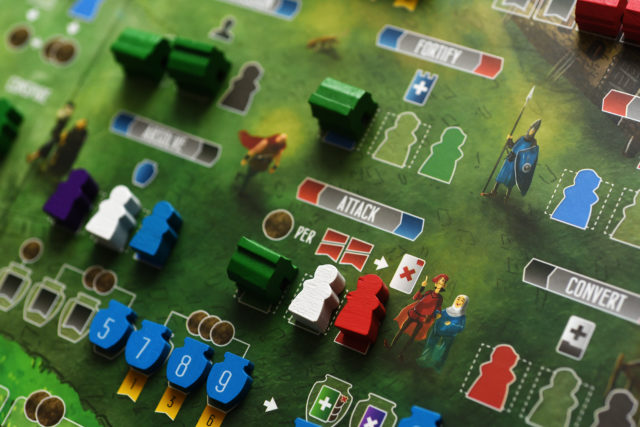It’s 900 AD in West Francia and it’s a turbulent time for the empire. They have developed the land and they’re intent on defending it, but outsiders seem to be encroaching from all directions. Luckily, the people are under the king’s protection and they can rely on his most trusty knights to keep them safe.

Paladins of the West Kingdom is the third Shem Phillips/Garphill Games title that I’ve tried. In fact, I started this year having never played Raiders of the North Sea or Architects and Paladins of the West Kingdom. Now I’ve played all three. Each of them have a similar feel, helped I’m sure by the consistent illustrations by Mihajlo Dimitrievski. However, each one does its own unique thing with the worker placement mechanic. I’ve enjoyed all three games, and Paladins might be my favourite so far.
In Paladins, you each have your own (fairly large) player board where the majority of the action is going to take place. It is filled with places to send different workers to complete actions. The left side of the board can be summarized as actions that help build your engine, and the right side kinda is the engine. These are the places you are going to send your workers (Labourers, Scouts, Merchants, Fighters, Clerics, and Criminals) to do your bidding.
At the start of each round, you flip over a King’s Order and/or a King’s Favour card. Orders are goals you can try and accomplish for end game points. Favours are extra places you can send workers with usually pretty powerful actions. They also serve as a reminder of the seven round time limit to the game.

Rounds begin with you taking the top three cards from your Paladin deck, choosing one to keep for the round, placing one of the remaining Paladins back on top of the deck and one on the bottom of the deck. Paladins have a few stats to consider when you’re picking them. They grant you two workers for the round, but the type of workers is different for each one. They also provide a temporary boost for the round for one or more of your different Attributes (Faith, Strength, and Influence). Finally, each Paladin also has a special ability. You have the same deck of 12 Paladins, but the order they show up will be different for everyone.
After everyone has selected and revealed their Paladin, in turn order, everyone takes a Tavern card which gives them four more workers in different combinations. This gives everyone six workers to start a round, plus up to three workers they can carry over from a previous round.

On a turn, you take one action or pass. Usually, taking an action means placing one or more workers on a space on your personal board. Many places require a specific type of worker, but you can also substitute a Criminal which is wild. Oh those wild criminals!
So what are you going have these workers do for you? Let’s examine the actions on the left first.
Developing allows you to place a Workshop on one of the required worker spaces for another action. This reduces the number of workers you’ll need to send there next time you want to take it. This is super valuable and shouldn’t be ignored. Hunting and Trading earn you Provisions or Silver. Recruiting allows you to send one worker to hire a townsfolk to go off on a quest for you. You immediately get the benefits depicted on the top right of the card. If you spend two workers on recruiting, you can permanently hire them, gaining an ongoing benefit depicted on the bottom of the card. Praying let’s you pay two Silver to clear one worker space allowing you to use it again in the same turn. Finally, conspiring lets you trade any one worker to get a criminal.

Now at this point, you may be saying: ‘Wow! Criminals are great! There’s absolutely no reason not to get a criminal every chance I get.’ Here’s the reason why you may want to avoid Criminals sometimes. Every time you take one, you also take a Suspicion card. They will inform you take 0-2 Silver from a Tax pool. Once that pool runs out, an Inquisition occurs. The player(s) with the most Suspicion cards have to take a Debt card (you may remember these from other games in the series) worth minus three points if they haven’t been addressed by the end of the game. So Criminals are good, but they come with a potential cost.

The right side of the personal boards is more about action that will earn advancements on the attribute tracks and points. Here, a very cool graphic design decision has been made. The title for each action indicates on the left side the attribute that is needed to complete the action. On the right side of the title it indicates the attribute track that will be rewarded for completing it. For example, the Commission actions requires faith to send out one of your monks to the main board and it earns you influence. Black on the left of the title, blue on the right. It’s easy to quickly see how to do the different actions and why you might want to do each one.
So what are the actions? As mentioned, Commission allows you to place a monk on the main board. The higher your faith, the more options you have as to where to place them. The Garrison action works much in the same way, allowing you to place an Outpost on the main board. The more strength you have, the more options you have for placement. Fortifying gives your kingdom some protection.. You need influence and it provides strength. When you fortify, you draw from the Wall deck and gain the benefits from the card. Absolving is an interesting action. You need an increasing amount of faith to complete it. When you absolve, you move a jar covering one of the action spots. This lets you gain provisions or faith, recruit a townsfolk for free, flip a debt card, etc. You also automatically get to discard a suspicion card.

The final two actions involve the Outsiders that are invading your hometown. On the main board there is a row of Outsider cards. They have an increasing level of strength to Attack them. When you Attack, you choose an Outsider with a strength you can defeat based on your strength attribute. You claim the card and get its immediate bonus displayed on the top right. If you’re feeling a bit more diplomatic, you can try and Convert them. This action depends on your faith. You can claim one of the Outsiders for end game points displayed on the bottom of the card. They can reward you for Attacking Outsiders from certain factions, developing your Attributes, or even collecting Debt cards. It’s expensive to convert, but it can yield big points.
Play continues with everyone taking one action at a time until everyone passes and a new round begins. After the seventh, scores are totalled for how high you got on the attribute tracks, Developing, Fortifying, Garrisons, Absolving, and Commissions at certain thresholds, Debts paid or unpaid, and points for your converted Outsiders.

There are lots of paths to victories, and Paladins is one of those games in which you won’t be able to do everything really well. You’re going to have to concentrate on a few factors and hope they work out for you. I’ve played it a bunch of times and I feel like I’m still scratching the surface. I’ve heard a lot of people say that Paladins is the deepest of the series, but I think it’s more accurately the broadest. There’s a lot you can do, but no one thing is too complicated. By the second or third round of your first game, you’ll have a good sense of what you’re doing.
I highly recommend Paladins of the West Kingdom. More than a great addition to the series, I think it’s the best one so far!
A media copy of Paladins of the West Kingdom was provided by Renegade Game Studios for this article.
Comments
No comments yet! Be the first!